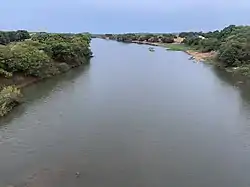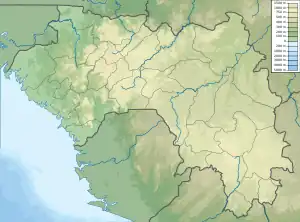Milo River
The Milo River is a river in Guinea in West Africa. It rises in the Simandou Mountains near Beyla, flows about 20 kilometres (12 mi) to the south of Siguiri and flows 300 kilometres (190 mi) north at which point it becomes one of the main tributaries of the River Niger.[1][2]
| Milo | |
|---|---|
 | |
 Location of the mouth within Guinea | |
| Native name | ߡߌߟߏ (N'Ko) |
| Location | |
| Country | Guinea |
| Physical characteristics | |
| Mouth | |
• location | River Niger |
• coordinates | 11°04′13″N 9°13′25″W |
The pre-colonial Baté Empire was founded in the seventeenth century and was situated in the Milo River valley.[3][4] In the colonial period, the river was a valuable transportation route, as it was navigable to shallow-draft vessels from Kankan to the Niger River.[1]
References
- O'Toole, Thomas; Baker, Janice E. (16 March 2005). Historical Dictionary of Guinea. Scarecrow Press. pp. 143–144. ISBN 9780810865457.
- Nemec jr., Jaromir (6 December 2012). Hydrological Forecasting: Design and Operation of Hydrological Forecasting Systems. Springer Science & Business Media. p. 137. ISBN 9789400946804.
- Osborn, Emily Lynn (10 October 2011). Our New Husbands Are Here: Households, Gender, and Politics in a West African State from the Slave Trade to Colonial Rule. Ohio University Press. pp. 1–. ISBN 9780821443972.
- Parker, John; Reid, Richard (10 October 2013). The Oxford Handbook of Modern African History. OUP Oxford. p. 127. ISBN 9780191667558.
This article is issued from Wikipedia. The text is licensed under Creative Commons - Attribution - Sharealike. Additional terms may apply for the media files.
